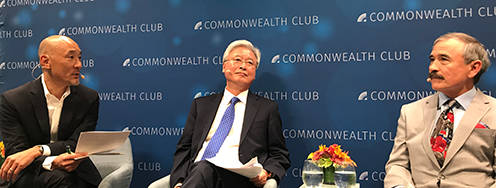Northern Exposure
Last week I had the opportunity to travel to Alaska. I went because a group of citizens wanted someone to come and speak to them about U.S. nuclear weapons policy and what they could do about it. Full disclosure: some of them are Ploughshares Fund supporters and others were members of groups that work to achieve nuclear weapons reductions and nonproliferation. I came back with an important reminder about the real-world aspects of what Ploughshares Fund works on and that everyone has the potential to make a difference.
It struck me that even in Alaska, where people are far away from the vortex of national security debate and the politics that can surround it, there was concern about how our country was planning to spend hundreds of billions of dollars on “defense” that would include weapons that do not make us safer.
Alaska does not have any Department of Energy (DOE) facilities where nuclear warheads are designed, maintained, stored or dismantled. It does not have nuclear ballistic missile fields like the upper continental U.S. It does not have any nuclear missile submarine bases or strategic bomber bases. Bottom line – there is not any nuclear weapons “pork” that gets the attention of Alaska’s congressional delegation or its citizens. True, Alaska does host several Air Force, Army and Coast Guard bases, and is home to one of only two U.S. missile defense interceptor sites. Still, when I think of places where people are aware of and concerned about nuclear weapons there is typically a tangible and proximate reason – an Oak Ridge, a Hanford Site, or a nuclear weapons design lab. My experience in Alaska reminded me that when it comes to the risks that these weapons pose, we all have a stake in the outcome.
Two things struck me while I was there. First, regardless of any direct financial or political connection to the topic, the people I met and spoke with were concerned on a fundamental level. Nuclear weapons still threaten us all, and they understood that. Second, when I spoke to them about the national price tag of nuclear weapons programs, the level of attention and concern grew. Seems that money has a way of closing real and psychological distances. With our national fiscal crisis and a consensus that federal spending must be cut, Alaskans are as interested and invested in the conversation as Beltway pundits or media talking heads.
The conversations I had and questions I was asked were insightful, and ranged from simply wanting more information about weapons to nuanced inquiries about that status of Israel as a nuclear weapons state. The most powerful thing I was asked, though, was “what can WE do to make a difference?” Thankfully, through the hard work of many of the groups we support, I was able to give them specific things to do and precise things to ask of their elected officials. From writing letters to their newspapers to meeting with their congressional delegation to educating friends and colleagues - the formula is not new. I was able to point out that Alaska’s senators hold committee seats of relevance to U.S. nuclear weapons programs (Senator Lisa Murkowski on Appropriations and Senator Mark Begich on Senate Armed Services) and this meant that they held particular sway on U.S. nuclear weapons policy and spending. The hunger for tactics and information was immense. That was inspiring.
Last week I went to Alaska thinking I would help educate people about nuclear weapons and U.S. policy. Well, that may have happened; but I came back inspired and impressed by the dedication and sincerity of people that support us regardless of their zip code.




